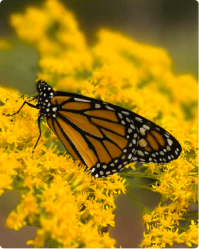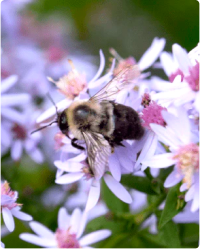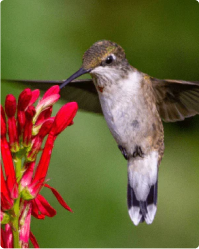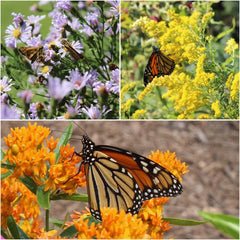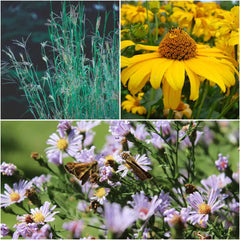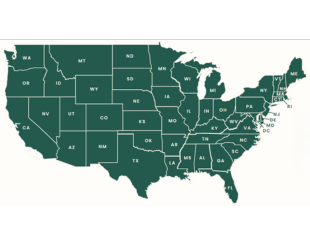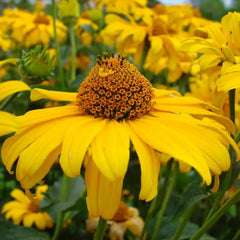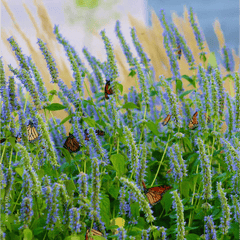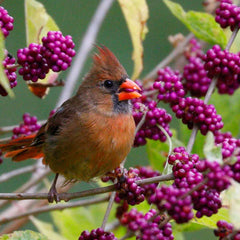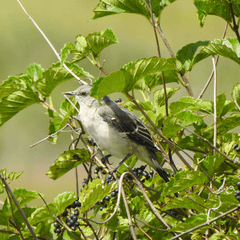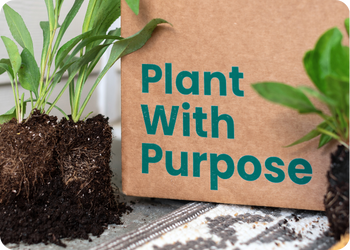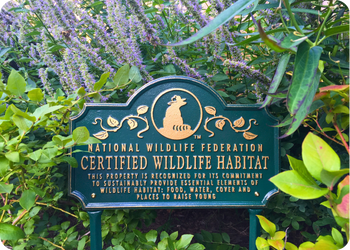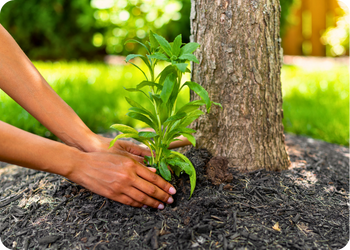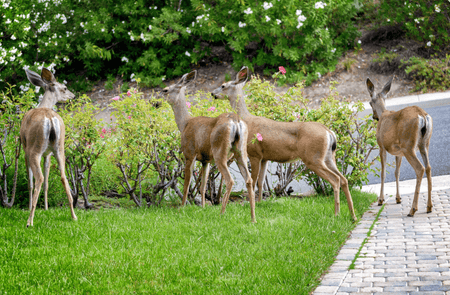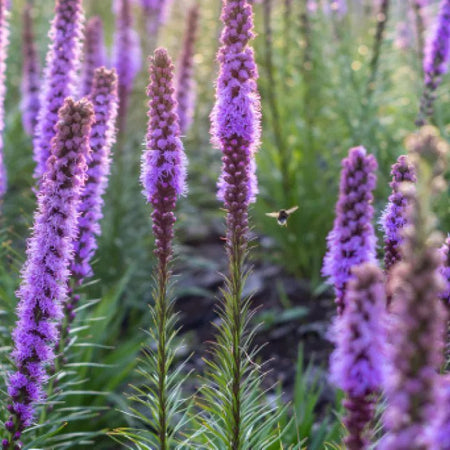Deer Resistant Native Plants: A Guide to Keeping Your Garden Safe and Beautiful


In the quest to establish a thriving wildlife habitat garden that attracts a diverse array of pollinators and other wildlife, selecting the right plants is a critical step. Native plants are the top choice for such gardens because they are part of the local ecosystem and naturally adapted to local conditions. However, gardeners often face the challenge of deer browsing on their carefully cultivated plants.
While deer themselves are wildlife, in many suburban and even urban areas their populations have swelled due to lack of predators and year-round food in the form of our landscapes. Sometimes the “gardening for wildlife” effort meets its end early when neighborhood deer overbrowse. When deer eat all of the native plants (either in natural areas or our gardens) they contribute to habitat loss for other wildlife such as birds, butterflies, bees and other pollinators that rely on those plants. The circle of life is a delicate balance!
Understanding Deer-Resistant Native Plants
Deer, especially in suburban and rural areas, can pose a significant challenge to gardeners and conservationists. Their voracious appetite can quickly diminish carefully planned native plant gardens. To combat this issue, many gardeners seek plants that are considered "deer-resistant." But what does deer resistance really mean?
Deer-resistant plants are those that are less likely to be eaten or damaged by deer. However, it's crucial to understand that no plant can be entirely deer-proof. Though no plants are totally resistant to deer browsing, some are less palatable to deer and therefore less likely to receive heavy damage.
A hungry deer may nibble on almost any plant, particularly when natural food sources are scarce. The level of deer resistance varies from plant to plant, and it can also depend on the local deer population's preferences.
Deer Resistant Native Plants: A Guide to Keeping Your Garden Safe and Beautiful
Deer can be a nuisance for gardeners, especially those who live in areas with high deer populations. These animals can quickly devour prized plants, leaving behind a trail of destruction. But there is hope! There are a number of deer-resistant native plants that you can plant in your garden to keep the deer away and your plants thriving.
Why choose native plants?
Native plants are plants that are adapted to the local climate and soil conditions. This means that they are generally less demanding to care for than non-native plants once they’re established. They rarely need supplemental watering, fertilizers or pesticides. They’re also the plants that wildlife from birds to butterflies rely on for survival as a source of food, cover and places to raise young. They’re the perfect choice for a wildlife habitat garden.
Benefits of Native Plants
Biodiversity Support: Native plants play a fundamental role in supporting local biodiversity. They provide habitat and food for a wide variety of insects, birds, and mammals, which, in turn, contribute to a more vibrant and resilient ecosystem.
Habitat Restoration: Using native plants in your garden helps restore the natural landscape, providing shelter and sustenance for native wildlife that may have been displaced by human activities.
Low Maintenance: Native plants are well-suited to local environmental conditions, which means they often require less water, fertilizers, and pesticides. This low-maintenance aspect makes them an excellent choice for sustainable gardening.
Pollinator Attraction: Native plants are particularly attractive to pollinators such as bees, butterflies, and hummingbirds. These plants provide nectar and pollen for these essential wildlife species, which in turn pollinate the plants allowing them to produce seeds, fruits, berries and nuts.
How are some native plants deer-resistant?
Some native plants have evolved to be deer-resistant. This may be due to a number of factors, such as:
Taste: Deer have a strong sense of taste, and they avoid eating plants that have a bitter or unpleasant taste. Milkweeds such as swamp milkweed and butterfly weed have a bitter taste that deters deer.
Texture: Deer also avoid eating plants with a tough or hairy texture. Some native plants, such as yucca and bearberry, have a tough texture that makes them difficult for deer to eat. Plants with spines or thorns such as American holly are avoided too. Native ferns and grasses such as little bluestem and northern sea oats aren't palatable to deer either.
Scent: Some native plants have a strong scent that repels deer. Shrubs with pungent leaves such as bayberry, wax myrtle and spicebush are often avoided. Wildflowers with fragrant leaves include bee balm and anise hyssop.
Now, let's explore a diverse selection of deer-resistant native plants to include in your wildlife habitat garden to foster pollinators and other wildlife.
If gardening only for deer isn’t your thing, try these deer-resistant native plants below.
8 Deer-Resistant Native Plants for Your Wildlife Habitat Garden
Little Bluestem (Schizachyrium scoparium)
- Shelters birds and offers seeds
- Attracts insects, supporting diverse wildlife, making it a low-maintenance, eco-friendly choice
- Thrives in varied soils, Little Bluestem is a resilient, low-maintenance grass
Switchgrass (Panicum virgatum):
- A valuable grass for nesting birds and insect shelter.
- Provides year-round interest with its seed heads.
- Drought-tolerant and adaptable to various soil types.
Butterfly Milkweed (Asclepias tuberosa):
- Attracts pollinators like bees and butterflies. Milkweed is the only host plant for monarch butterflies!
- Essential for the Monarch butterfly as a host plant for their larvae.
- Drought-tolerant and easy to grow.
Purple Coneflower (Echinacea purpurea):
- A favorite among bees and butterflies.
- Provides a profusion of vibrant purple flowers.
- Tolerant of a variety of soil types.
Black-Eyed Susan (Rudbeckia hirta):
- A bright and cheery wildflower adored by pollinators.
- Thrives in both sun and partial shade.
- Low maintenance and self-seeding.
Wild Bergamot, Bee Balm (Monarda fistulosa):
- Attracts bees and hummingbirds with its unique blossoms.
- Aromatic foliage adds to its appeal.
- Resistant to powdery mildew.
Eastern Red Columbine (Aquilegia canadensis):
- A host plant for the Columbine Duskywing butterfly.
- Loved by hummingbirds.
- Tolerates partial shade.
New England Aster (Symphyotrichum novae-angliae):
- Attracts bees, butterflies, and other late-season pollinators.
- Offers vibrant purple or pink flowers in the fall.
- Resistant to deer and pests.
Ways to Deter Deer from Your Garden
If you need to deter deer from your garden, do so naturally using methods that do not rely on chemical repellents or electric fencing.
Here are some natural ways to deter deer from your garden:
Native Plants: Native plants can often tolerate deer browsing because they have evolved alongside local wildlife and some have natural defenses. Research which native plants are suitable for your region and include them in your garden. Choose plants that are naturally unappealing to deer.
Tree Guards: If you have small trees and shrubs, protect them with trunk guards. These plastic tubes fit over the plant preventing browsing but allowing sunlight and water in. These can help small woody plants get established without pressure from deer. For slightly larger trees, guards will prevent male deer from rubbing their antlers which can damage the tree bark..
Companion Planting: Use companion planting techniques to make your garden less attractive to deer. For example, interplanting garlic, chives, or onions among your vegetables can discourage deer.
Landscape Design: Create a garden layout with a variety of heights and textures to make it less appealing to deer. A diversely planted garden with different shapes and sizes of plants that mimic nature makes deer browse less noticable than formally planted gardens.
Noise and Motion - Deer are prey species and are naturally cautious. Sudden movements can help deter them. Consider placing rotating pinwheels in garden beds to create movement. Or install motion detector lights, music or even sprinklers to spook deer as they enter your garden area.
Repellents - There are many deer repellent sprays on the market and recipes for homemade ones that use natural ingredients such as garlic, hot pepper and eggs that make plants taste bad. They can be effective but must be re-applied often and could deter other wildlife too.
Remember that while these natural methods can be effective, none are 100% foolproof. The only way of keeping deer from eating your plants is to install 8-foot fencing around the entire property or garden space, which is rarely practical and can be expensive. A combination of strategies and vigilance is often necessary to successfully deter deer from your garden. Additionally, what works may vary depending on your specific location and the local deer population.
Benefits of Deer Resistant Plants
Creating a thriving wildlife habitat garden that caters to the needs of pollinators and other wildlife while deterring deer is a rewarding and environmentally responsible endeavor. By incorporating deer-resistant native plants into your garden, you not only reduce the risk of deer damage but also support local ecosystems and promote biodiversity.
It is crucial to remember deer resistance should not be the sole criteria for selecting plants for your garden. The primary focus should be on the ecological benefits that native plants bring to the table. These plants have evolved over time to meet the needs of local wildlife and create a balanced, self-sustaining habitat. By carefully choosing the right native species, you can transform your outdoor space into a haven for pollinators and other wildlife, contributing to the conservation of your local environment while enjoying the beauty of a natural, thriving garden.

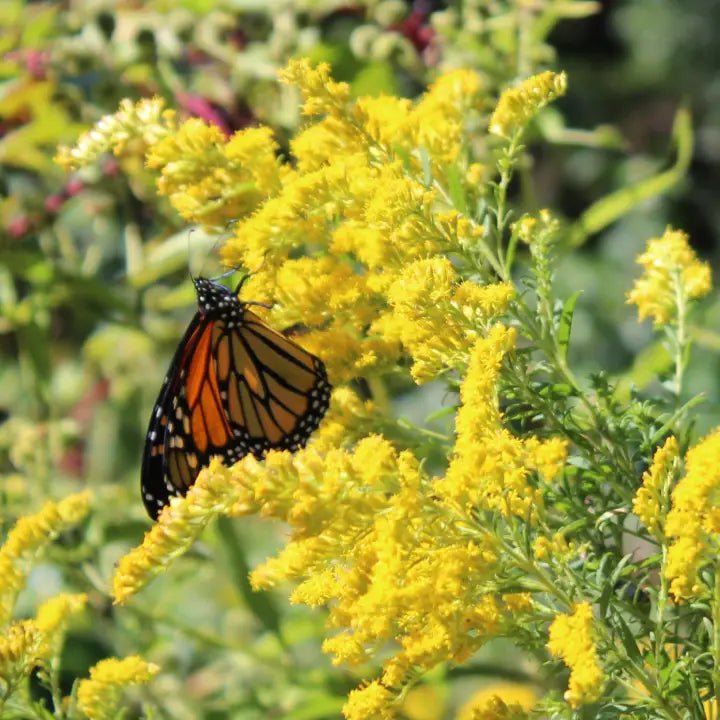
Find Native Plants by Zip Code
We took the guesswork out of planting native. Check your zip to see what ships!
